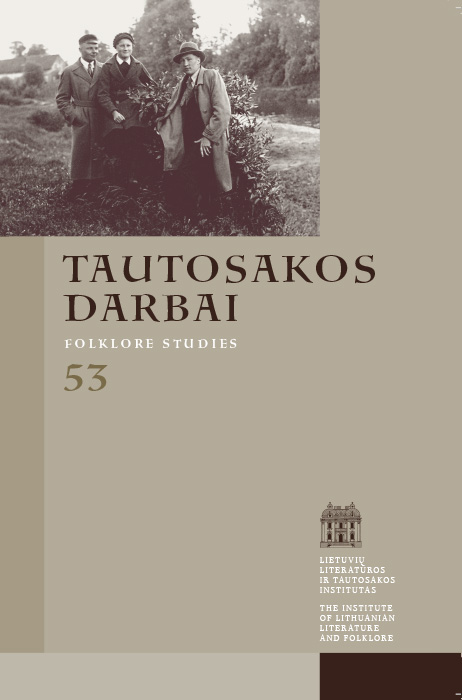“Everything Is Easy for Me…” Ethnological Research of Consciousness
Abstract
Veronika’s practical ways of dissociating from troubles merit special attention. The author interprets her byword baika (‘trifle’) as used to remind of the emptiness of everything that takes place. Her characteristic abstaining from judging other people’s actions is defined as an unjudging amiability. This typical abstaining also involves disinclination to create systems or subordinate all phenomena to the requirements of a single one. Abstaining from judgement rests on her feeling that “there is more” to things than could be gained from a single situation.
Although the above-mentioned qualities may seem as pertaining to an indifferent or passive consciousness, this is disproved by Veronika’s obvious capacity of making decisions. Describing the way of her decision making the author discloses that decisions are seen in the situation. Here, the concept of tacit and secret decisions by Maurice Merleau-Ponty comes particularly handy. It is easier to perceive such seen decisions after having acknowledged that consideration, decision, and selection is possible even for implicit self.
All these qualities are permeated by the expression of being content. Being content rests on an easy sense of being appropriate. The sense of easiness is achieved by allowing the life to be the way it is.
Downloads
Most read articles by the same author(s)
- Giedrė Šmitienė, Neringa Markevičienė, Does not Choose Writings or Letters – They Just Happen. On Publication of Balys Sruoga’ Letters from Stutthof , Tautosakos darbai: Vol. 68 (2024): Tautosakos darbai
- Lina Būgienė, Giedrė Šmitienė, Jurga Jonutytė, On the Occasion of Publication of Janina Degutytė’s Letters , Tautosakos darbai: Vol. 69 (2025): Tautosakos darbai
- Giedrė Šmitienė, Interspecies Experience of Illness. Anthropological Approach to Several Texts by Janina Degutytė , Tautosakos darbai: Vol. 64 (2022)
- Giedrė Šmitienė, Jurga Jonutytė, Foreword , Tautosakos darbai: Vol. 68 (2024): Tautosakos darbai
- Rūta Latinytė, Giedrė Šmitienė, Vaiva Aglinskas, Irena Žilienė, Information , Tautosakos darbai: Vol. 68 (2024): Tautosakos darbai
- Giedrė Šmitienė, Virtual Dialog with Maurice Merleau-Ponty. Examining the Traditional Culture in Terms of Perception , Tautosakos darbai: Vol. 47 (2014)
- Giedrė Šmitienė, Ordinary Letters: Contextual Research Method , Tautosakos darbai: Vol. 55 (2018)
- Giedrė Šmitienė, We Wish the Same on All Occasions – Freedom and Home. Letters from Exile by Kazimiera Kairiūkštytė-Galaunienė (1953–1955) , Tautosakos darbai: Vol. 53 (2017)
- Giedrė Šmitienė, Three Letters on Freedom and Myths , Tautosakos darbai: Vol. 53 (2017)
- Giedrė Šmitienė, Experience of Earth. The Case of Janina Degutytė , Tautosakos darbai: Vol. 54 (2017)
